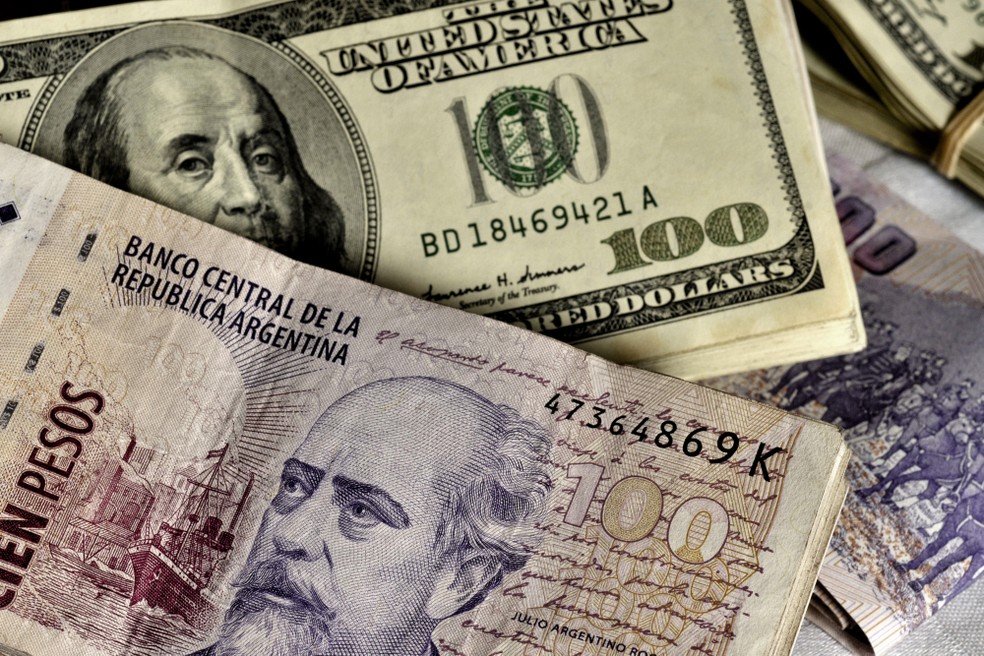RIO DE JANEIRO, BRAZIL – In July, 3.9 million Argentines bought the official limit of US$200 (R$1,000) for personal savings. In August, the figure reached US$5 million. In September it seemed that a new record would be broken, but the Central Bank was quick to discourage demand and thus protect its reserves.
On Tuesday evening it announced a package of measures restricting the purchase of foreign exchange for accumulation, the use of cards abroad, and foreign exchange operations with bonuses. The decision prompted a drop in Argentine bonds in international financial markets and a sharp depreciation of the peso in the unofficial foreign exchange market.
With this strict exchange control decreed by the Central Bank, Argentines will be allowed to continue exchanging pesos for the maximum limit of US$200 per month – a deeply rooted habit to protect themselves from inflation (42.4 percent per year) and the depreciation of the peso (around 20 percent in the official exchange circuit and 45 percent in the parallel in 2020)- but it will cost them more.

Until Tuesday, the dollar was quoted in banks at 79.25 pesos, but a tax of 30 percent was applied on this amount, which in practice raised the rate to 103 pesos per unit. From Wednesday on, the tax will reach 35 percent, to be later deducted by the tax authorities.
Purchases in dollars with credit and debit cards will be deducted from the US$200 limit. Exceeding this amount, the limit will be reduced in the following months, meaning that if someone spends US$1,000 on cards in a month, they will not be allowed to buy foreign currency in the official market for five months.
Argentine President Alberto Fernández advocated the restrictions intended to discourage the accumulation of foreign currency and speculation “in a country where dollars are needed to produce, not to keep”. Argentina, which is experiencing its third year of recession, suffers a chronic shortage of foreign currency that has led to the imposition of exchange restrictions on governments of different political spectrums.
The exchange rate difference between what could be bought in dollars on the official market (103 pesos) and what could be sold on the parallel market (131 pesos) increased interest in retail purchases, thus pressuring the level of Central Bank reserves, which on Tuesday closed at US$42.495 billion ( R$ 223 billion). In September, the institution’s reserves dropped by US$350 million (R$1.8 billion) and more than US$2.4 billion (R$12 billion) in the year.
“The worrying aspect of this evolution is that international reserves are dropping in a context in which the trade surplus accumulated up to July is the highest since 2009, there is no spending of foreign exchange for tourism and since April 2020 no interest is paid on public bonds in foreign currency,” says a report by PxQ consultancy, led by former Deputy Minister of Economy Emanuel Álvarez Agis.
The new tax means the elimination of the exchange difference between the official dollar and the parallel one (blue, as it is called in Argentina), but the market reacted as many analysts expected: with a sudden depreciation of the peso, of up to ten percent. On Wednesday, the blue dollar was quoted at around 145 pesos, while many banks temporarily suspended online purchases to adjust to the rules.
New sovereign bonds in dollars under foreign law, issued by the debt restructuring made last month, fell between three and six percent on Wednesday, while the country risk was close to 1,200 points.
The Central Bank also determined to compel companies to refinance debt capital maturities, eliminated the option for non-resident financial agents to liquidate shares and bonds in foreign currency, and limited the possibility of settling transactions with securities and amounts fully performed abroad. “The decisions mentioned will restrict speculative operations conducted by investment funds not residing in the country and their impact on the dynamics of financial and exchange markets,” said the Central Bank.
Source: El País

